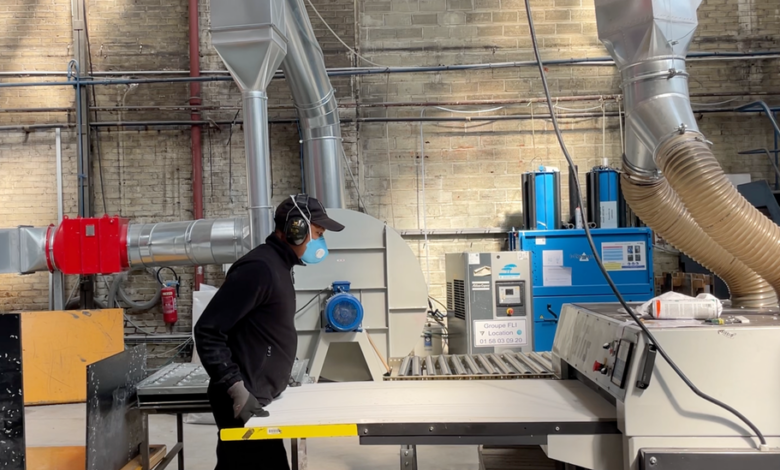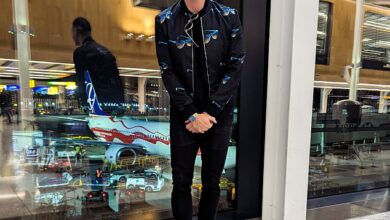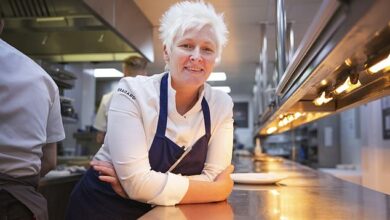Inside the factory that turns waste into Olympic podiums

The world’s best athletes will receive their gold medals at this summer’s Olympic and Paralympic Games in Paris while standing on trash. Recycled food containers, to be precise.
The silver Olympic podiums, which are currently being erected all over France, were made in a small factory on the outskirts of Paris by a start-up called The Pavé with 100 percent recycled plastic. It is a first for an Olympic Games.
“There is an abundance of plastic that is harmful to the environment, but which also has proven economic potential if it can be reused,” said Maurius Hamelot, 29, co-founder of Le Pavé, as he walked around his factory, a former steel foundry that had been converted.
And that’s not all: Le Pavé also made 11,000 grandstand seats for two nearby sports stadiums that were built especially for the Games. They were all made from used shampoo bottles and millions of multi-coloured caps.
Just a few years ago, the company had just three employees. But an unexpected call from Olympic organizers led to a hefty contract, and the company has expanded to a workforce of 34 and opened two factories. In the process, it has become a poster child for the Paris Olympic Committee, which has pledged to make these the greenest Olympics in history.
Le Pavé is part of an increasingly dynamic start-up culture growing in France, fueled by the ambitious policies of President Emmanuel Macron’s government to transform the economy with new industries focused on clean technology and a green transition.
“Before, it was seen as a start-up if you only developed software,” said Jim Pasquet, 31, Le Pavé’s other co-founder. “We are a new type of industrial start-up, focused on environmental needs, and our goal is to become a European leader.”
Mr. Hamelot was already working to transform plastic waste collected in Parisian neighborhoods into high-quality components for the construction industry. As an architecture student at the University of Versailles, he had set his sights on the construction industry, one of the largest sources of carbon emissions.
“The two things that are common in construction are waste and mess, everywhere in the world,” he said. “How do you reinvent the materials that are used to build without harming the environment?”
Mr Hamelot bought a used pizza oven and began experimenting with melting down discarded plastic from electronic waste, including old coffee makers and telephone receivers, which he chopped up in a blender. In 2018, he and Mr Pasquet, friends since childhood, founded Le Pavé and won a series of innovation competitions that saw them enter the The Ruchean incubator in Paris that focuses on social entrepreneurship, digital technology and craft and culture. There they raised a modest amount.
In 2019, they patented a thermal compression molding technology for use in the construction industry. Shortly after, Mr. Hamelot received a call from Solideo, the French company overseeing infrastructure for the 2024 Games, including a new Olympic Village on the northern outskirts of Seine-Saint-Denis designed to promote zero waste.
Organizers, seeking to halve greenhouse gas emissions compared with previous Games, wanted to know if they could produce 11,000 seats for a new Olympic aquatic center that would be built for swimming, and for the new Adidas Arena, which would host gymnastics and badminton competitions.
“It was an incredible opportunity,” said Mr Pasquet.
Invested with money from BPIa French state investment bank focused on start-ups, they set up shop in an abandoned steel factory in Aubervilliers, a poor suburb of Paris close to many Olympic venues.
Mr Hamelot and Mr Pasquet worked with 50 local recycling companies to collect used plastics, experimenting with dozens of prototypes and conducting stress tests before signing a final agreement with Solideo for the stadium seats in 2022.
Armed with the philosophy that working locally can have a big social impact, they hired workers from Seine-Saint-Denis. Among them were people who had been unemployed for a long time, but also an asylum seeker and a former prisoner who were eager for a new start.
The company added an educational dimension by asking a non-governmental organization, Lemon Tree, to include 50 primary and secondary schools in the Ile-de-France region. Some 1,700 schoolchildren collected a million yellow caps, which were used to provide the black and white stadium seats with splashes of color.
While learning about recycling, the children peppered Mr. Hamelot with tough questions about the impact of plastic on the environment and how to reduce carbon emissions. “The children were critical and seriously engaged,” he said.
In all, Le Pavé used 100 tons of recycled bottles and caps to create panels for the 11,000 stadium seats, which were pressed into shape by a French company specializing in arena seating. To create the panels used for the 68 silver Olympic victory podiums, Le Pavé used 18 tons of recycled plastic and plastic foam food containers.
On a recent day, eight people bustled around the Aubervilliers factory, where a rainbow of recycled plastic beads and chips sat in giant bags. Some workers used a forklift to feed beads into a special heater, while others guided the finished panels through a cutting machine.
The recycling process itself leaves a carbon footprint, including heating the ovens and cutting the plastic panels, but it uses far less carbon dioxide than using virgin plastic, Mr. Pasquet said.
“We are making something beautiful out of old waste that is polluting the planet,” he said.
They are opening a second small factory in the Burgundy region in eastern France and are raising funds to open two more in the west and south. While the government wants to reindustrialize France, Le Pavé’s goal is to create jobs by opening small factories, Mr. Pasquet said, adding that the old model of megafactories no longer met today’s environmental and social challenges.
The Le Pavé factory in Aubervilliers served as an exclamation point for that statement, with all its major equipment painted bright pink instead of industrial gray. “We want these to be the new colors of the industry, to move away from the old image,” he said.
Recently, the Elysee Palace, the president’s official residence, installed a decorative wall by Le Pavé. The company also produces panels for major French furniture retailers and has projects in the pipeline to make parquet flooring for homes and buildings.
Knowing that their ideas have come to life for the Olympics has been a huge motivator. “We see that we have an opportunity to build something that will last for years and years,” Mr. Hamelot said. “This is about something that is bigger than all of us.”




